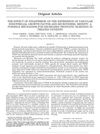Anti-Androgenic Therapy with Finasteride Improves Cardiac Function, Attenuates Remodeling, and Reverts Pathologic Gene Expression After Myocardial Infarction in Mice
August 2018
in “
Journal of Molecular and Cellular Cardiology
”

TLDR Finasteride improves heart function and repairs damage after heart attack in mice.
The study found that finasteride, an anti-androgenic therapy commonly used to treat hair loss and benign prostate disease, improved cardiac function, attenuated remodeling, and reverted pathologic gene-expression after myocardial infarction (MI) in mice. Finasteride reduced cardiomyocyte hypertrophy and interstitial myocardial fibrosis after MI, and enhanced angiogenesis, which typically entails better cardiac performance. The study suggests that finasteride may have a beneficial role in post-MI remodeling in mice, but further studies are needed to determine the potential therapeutic effects in large animal models of cardiac remodeling and heart failure before clinical trials can be envisioned.







